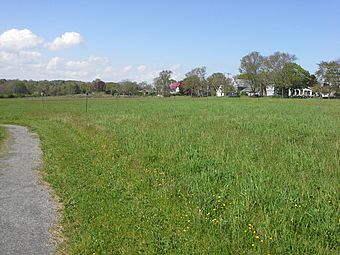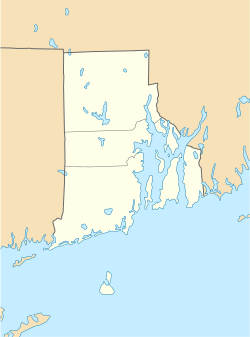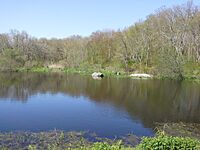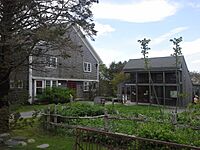Norman Bird Sanctuary facts for kids
Quick facts for kids |
|
|
Smith–Gardiner–Norman Farm Historic District
|
|
 |
|
| Location | 583 Third Beach Rd., Middletown, Rhode Island |
|---|---|
| Area | 129 acres (52 ha) |
| Built | 1750 |
| Architect | Clarke and Howe |
| Architectural style | Federal, Colonial Revival |
| NRHP reference No. | 08000234 |
| Added to NRHP | June 16, 2008 |
The Norman Bird Sanctuary is a special place in Middletown, Rhode Island. It is a 325-acre (1.32 km2) bird sanctuary and nature preserve. Here, you can find an environmental education center and a museum. The sanctuary is located at 583 Third Beach Road, looking out over the Atlantic Ocean.
This amazing place was started in 1949. Mabel Norman Cerio left money in her will to create it. The sanctuary is the biggest protected open space in Newport County. It has 325 acres and 7 miles of trails for hiking. You can explore hay fields, woodlands, and hills that look out over the ocean and ponds. A famous spot called Hanging Rock is also here, with great ocean views. There is a Visitor Center with a gift shop. You can also visit a barn museum from the 1800s. It has cool displays about local wildlife for everyone to learn from.
Contents
History of the Sanctuary
The land where the Norman Bird Sanctuary sits has a long history of farming. It goes all the way back to the early 1700s. Isaac Smith, whose family was among the first settlers, bought a large piece of this land.
The Old Farmhouse
The main farmhouse on the property is a classic Colonial-era home. It was built around 1755. It has five sections across the front and a big chimney in the middle. In 1782, the property, which was then 200 acres (81 ha), changed owners. Benjamin Gardiner bought it at that time.
Mabel Norman's Vision
Later, in 1898, a businessman from Newport named George Norman bought the farm. By then, it was about 129 acres (52 ha). His daughter, Mabel Norman, updated the house. She gave it a look that reminded people of old Colonial styles. This main part of the sanctuary was added to the National Register of Historic Places in 2008.
Gallery
More Places to Explore
 | Bayard Rustin |
 | Jeannette Carter |
 | Jeremiah A. Brown |





